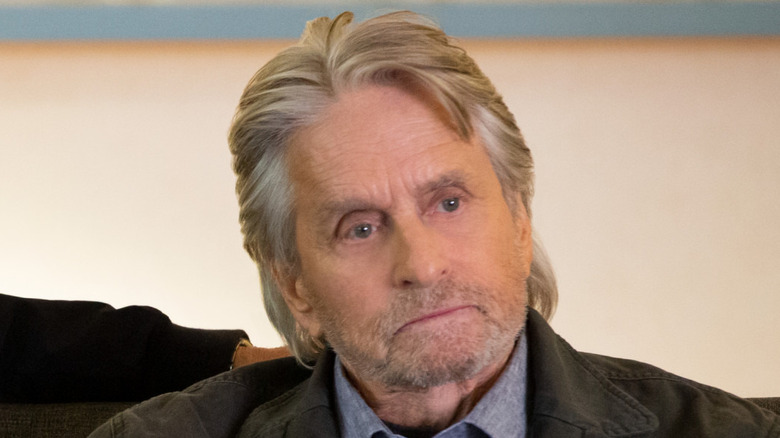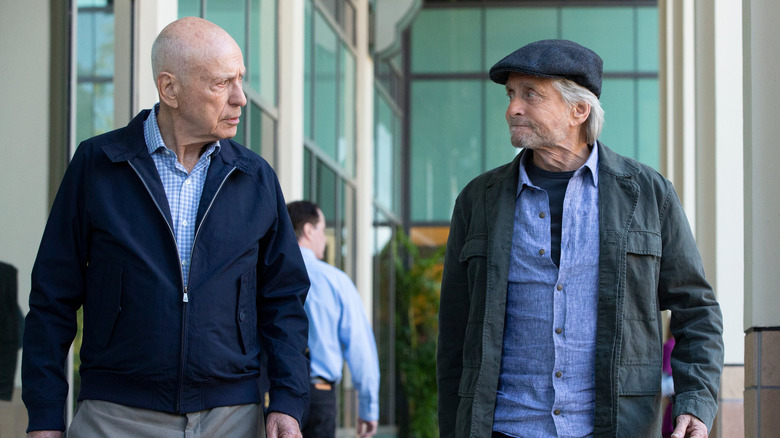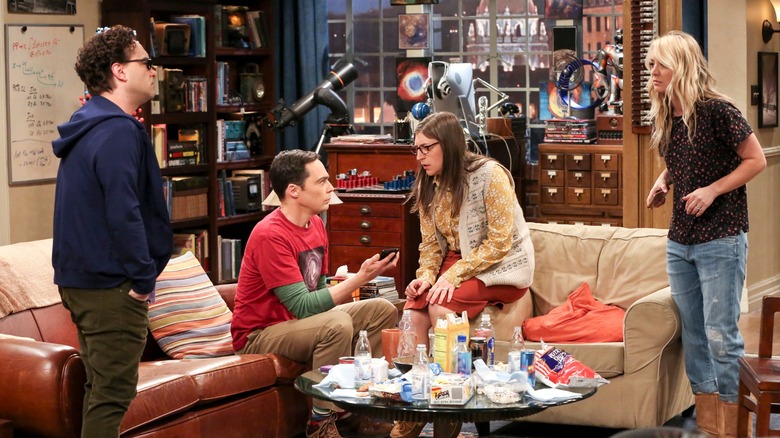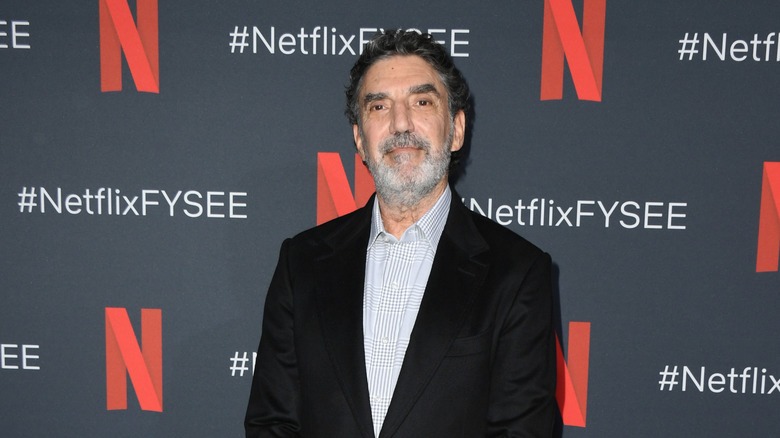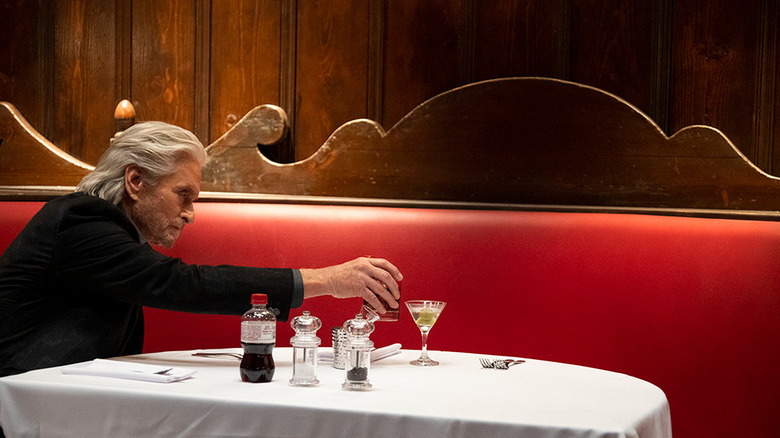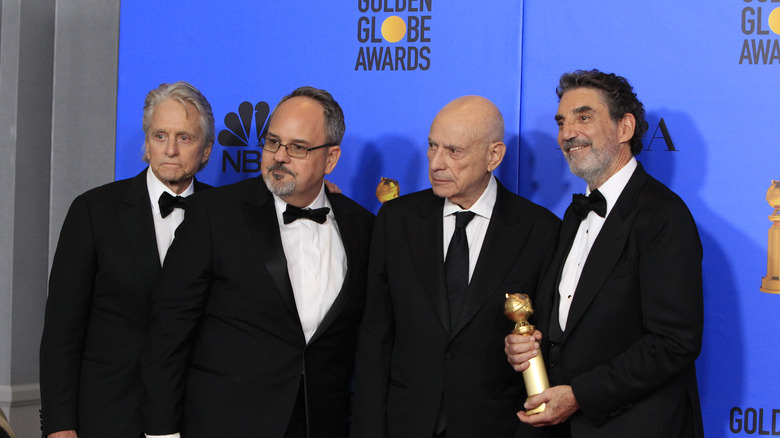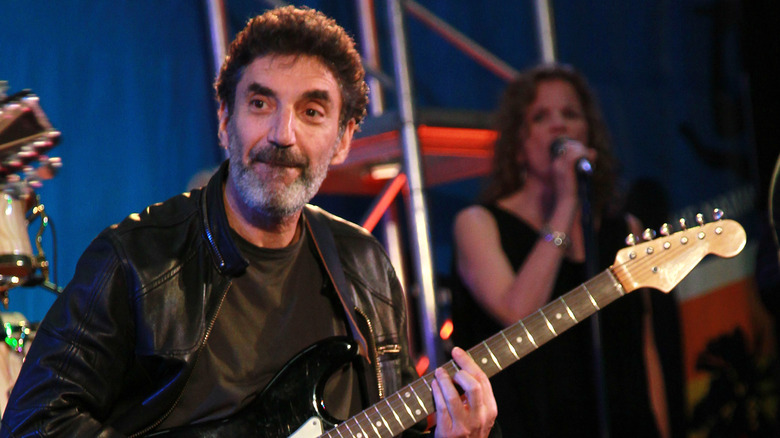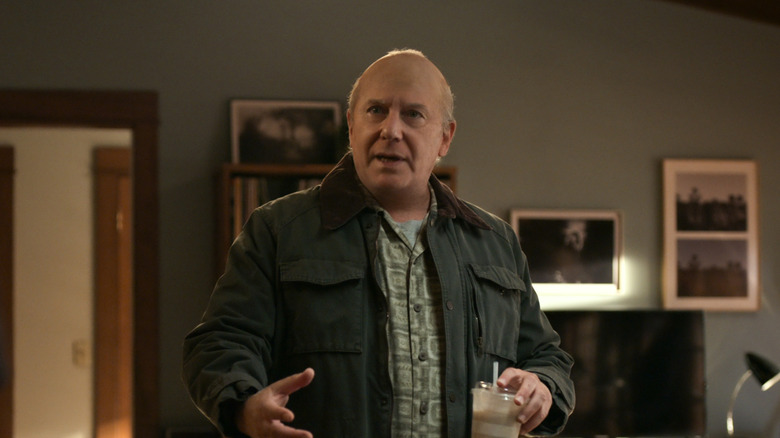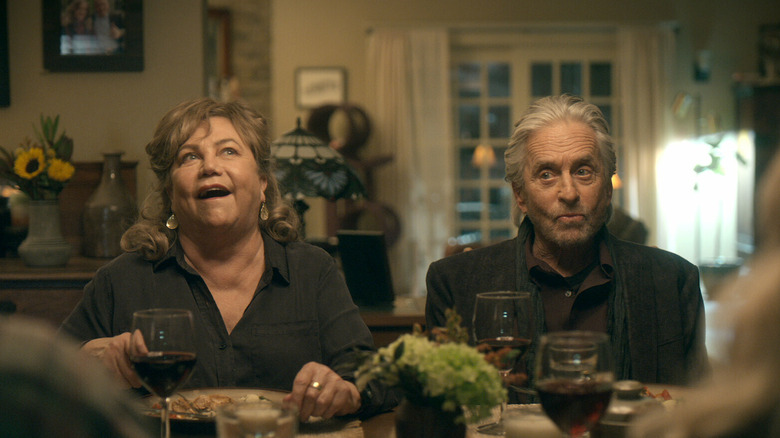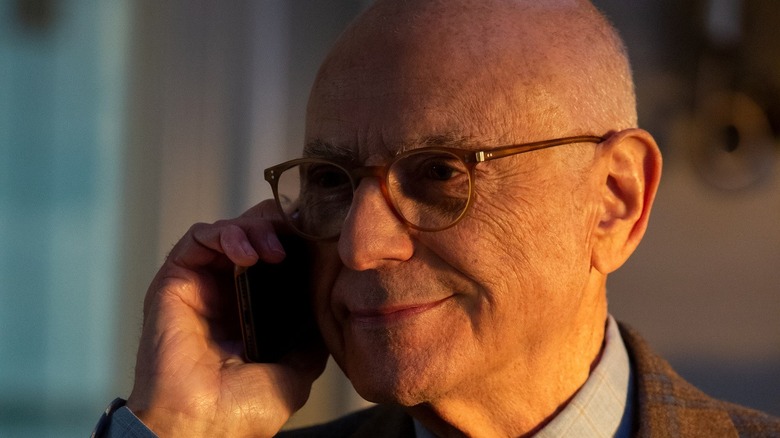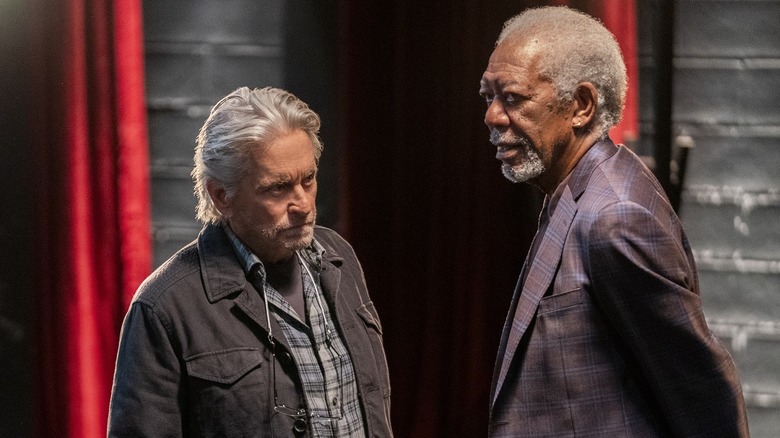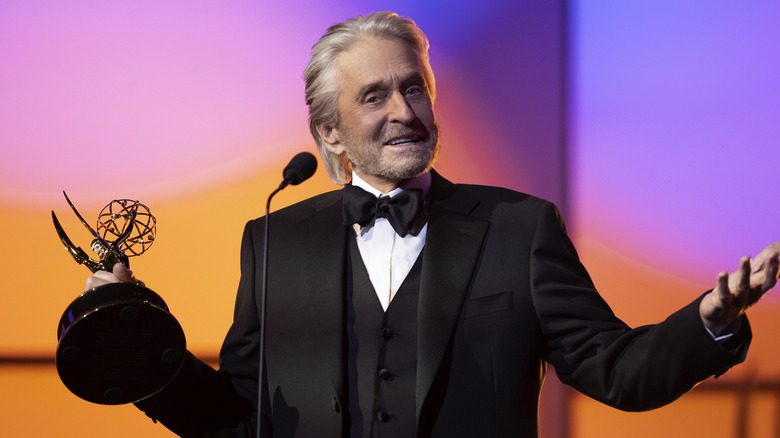The Untold Truth Of The Kominksy Method
"The Kominsky Method" is a study in contradictions. It's a TV series about old people set in an industry known for worshiping its young and beautiful. The series is a streaming single-camera comedy created and written by a legendary network multi-cam sitcom guy. Even more, this story about aging is made possible by the new technology that's revolutionized the business.
The premise to the Golden-Globe-winning, Emmy-nominated "Kominsky Method" is simple enough: a 70-something-year-old actor who never had a big break, Sandy Kominsky, runs an acting studio where he teaches a much younger generation. His best friend is even older, a recently-widowed 80-something-year-old partner at a successful talent agency. There are jokes about prostates and urine streams, about funerals and sex, and about legacies. There's also a lot of heartfelt meditations on friendship and love, on the ravages of aging as well as the beauty of being old enough to have some idea of what really matters. Plus there are some comic gems that have never been explored, such as when Sandy realizes his lack of testosterone has made him a better man, all pulled together by one of the leading sitcom creators, Chuck Lorre.
So how do a sitcom guy, a streaming service, and two old Oscar-winning film actors come together to make an award-winning streaming series about aging while keeping a sense of humor? They use "The Kominsky Method."
Chuck Lorre wanted to make a show about growing old
"Kominsky Method" creator and showrunner Chuck Lorre has been working on hit TV shows since the '80s. Any sitcom writer would dream of having his career, from his early days at "My Two Dads" and "Roseanne" to the first two hit series he created, "Grace Under Fire" from 1993-1998 and "Cybill" from 1995-1998 to "Dharma & Greg" from 1997-2002. Of course he may be best known for the sitcoms he created in the first quarter of this century, including smash hits "Two and a Half Men" and "The Big Bang Theory." "The Kominsky Method" is totally different from basically all of these. The focus of "Kominsky" is a historically unfunny topic: growing old and dying.
"I wanted to write about the experience of getting older: how that feels in terms of your body, your relationships, losing loved ones, being estranged from the culture," Lorre explains in an EW interview. "I loved this process. It was a real gift for me, starting with Michael Douglas agreeing to star in it and Alan Arkin coming on board."
Michael Douglas is an A-list movie star so to get him on a series was a big win. Luckily, Douglas loved the material. "I read Chuck's script and I said, 'this is really interesting,'" Douglas tells Variety. "I hadn't seen writing like this in a feature film. I thought, this is just a great opportunity to work with the great comedy stuff and learn a little more about timing. I'm always a sucker susceptible to a good comedy. So I said, 'let's do it.' "
This show is unique for Lorre
"The Kominsky Method" is a huge departure for Lorre, whose whole career was built on multi-camera sitcoms. Before "Kominsky," his first single-cam show without a studio audience was "Young Sheldon." Lorre (per Deadline) admitted he was "a nervous wreck" about doing his first single-camera show. "It's an entirely different animal, and the working process is very different. It's much slower."
"Kominsky" is closer to home for Lorre than his other series. "I don't have to make this stuff up. On 'The Big Bang Theory' we would be regularly talking to our astrophysicist consultant David Saltzberg," Lorre tells the New York Times. "I didn't need to have a consultant on this one."
He also explained this is a departure from his bread and butter, the sitcom: "It comes from 'Situation Comedy.' There's no situation here other than the fact we get older. ... So I think you're hard-pressed to call those situations. The situation is just life."
Leaving the networks for "The Kominsky Method" on Netflix was also another huge career first.
Lorre had to change it up with a streamer
"Would this have been possible on a major broadcast network? I don't know," Lorre tells the New York Times. "I had a steep learning curve because I had been doing the studio audience, four-camera approach for decades ... I wanted to learn a new trick."
There were some upsides to going with the streamer. As Variety put it in an interview with Lorre, "The ability to pitch such a story to an outlet like Netflix ... that is not concerned with drawing advertiser-friendly demographics has been a game-changer for creatives." This was similarly one of the factors that resulted in Netflix picking up "Longmire" which attracted an older demographic.
Plus working with Netflix was liberating. "It doesn't matter if [the episode] is 32 minutes or 28 minutes — just tell the best story you can," Lorre tells Variety. "I've never known that kind of freedom. It's really something."
Lorre did a lot of solo writing for "Kominsky"
"The Kominsky Method" also presented Lorre with an opportunity to try out another "new trick," writing a lot of episodes by himself. In part due to COVID-19 and in part due to Netflix's looser release schedule, Lorre spent a lot of time writing and without the writing room most showrunners depend on. In a Deadline interview of him and Michael Douglas, Lorre says that "the normal television shows that I've been doing for many, many years ... the urgency to deliver a new episode every week ... you have to approach the scripts or writing room, a group of writers that can plow through exhaustion and frustration and keep it moving."
He adds, "This gave me the luxury to sit there and write, for the most part, by myself and find out if I still had a voice if no one else was in the room."
After Lorre claims he felt helped out by the years of experience Douglas and Arkin bring to the show, Douglas states it might just be false modesty. The actor rebuts with, "I would... be terrified after going from a whole writing group to basically writing alone, but I got improvement just out of watching Chuck's enthusiasm for treating this, after all his successes after all these years, as a new experience, and him actually enjoying the fact of having the additional pressure of not having other writers to work with or passing it over, but basically completing everything himself."
When "Kominsky" won its first Golden Globes, few had heard of it
"Why You've Never Heard Of 'The Kominsky Method'" is the title of a Forbes article about the show's big night at the 2019 Golden Globes. That year, just after Season 1 of "Kominsky," the series won Best TV Comedy/Musical and Douglas won Best Actor in a TV Comedy or Musical. Part of it, that article posits, might be that the demographic interested in a show about two aging white males may not be the most active on social media. Another factor might have been that the show was only out for a few weeks, during a time of year when most people are turning their attention to holiday blockbusters.
A Business Insider article from 2019 brought up the fact that it wasn't even in the top 100 streaming shows as an explanation for why it flew under the radar. The articles did mention that the people who had watched the show liked it, with a high Rotten Tomatoes ranking (and the series still has a 93% on the Tomatometer). According to Nielsen ratings cited by Indiewire in June 2021, however, "The Kominsky Method" was second among streamers, just behind "Lucifer." So obviously with those Globe wins, the rest of the world caught on.
Lorre's failed music career inspired Sandy
Chuck Lorre started as a musician. As he says in an NPR interview, "about 17-18 years, I played saloons in Alaska and cruise ships in the Caribbean and all points in between." He adds more about the role music played in his life. "Playing music impacted on the way I listen to words. There's rhythm in dialogue; there's pauses like there's rests in music."
However, the music is more than just inspiration for his writing; it's an inspiration for the "failed" actor Sandy Kominsky. He gets really deep in a Hollywood Reporter interview: "I didn't set out to be a TV writer. My journey into TV came after 15 years of banging my head against the wall trying to make it in the music business. There's a moment in the last episode where he's talking to Roz, played by Kathleen Turner, and he's staring up at that billboard talking about dreams deferred and that this wasn't supposed to happen. He says, 'I've lived my life with a broken heart,' and without going too deep into this personally, my music career didn't happen — I had a bit of luck along the way, but there was a broken heart associated with that and there still is because it was my first love."
So Chuck Lorre still feels like a failure on one front. Celebrities, they really are just like us.
Paul Reiser aged up and went bald for his role
The depiction of Michael Douglas as an old man struggling with libido and urination is certainly a new way to see him. But the biggest "Oh man what happened to him?" moment comes when you see Paul Reiser. He's almost unrecognizable playing an overweight retired high school English teacher named Martin with a bald head and a questionable ponytail. He's a type of karmic retribution for Sandy Kominsky as he, at 65, is dating Sandy's 32-year-old daughter, echoing Sandy's former proclivity for dating younger women.
Reiser had known Lorre when the showrunner was a writer on "My Two Dads." And as Reiser told Forbes, he had called Lorre to congratulate him on "The Kominsky Method" when Lorre told Reiser he had a character Reiser could play. He "had this role of Martin in mind, so he invited me to come on, but then he said, 'I want to be clear with you, we're going to age you up, we're going to pad you, we got bald you, and we're going to give you the ponytail.'"
Reiser has been nominated for an Emmy for his performance as Martin, his 11th nomination (without a single win so far). Though all that aging up and padding, while it won him an award nomination, has come at a cost, according to the article.
"The downside is that a lot of friends were calling me saying, 'You don't look well,' and then I had friends who were too scared to call me who would call other friends and ask, 'What happened to him?' The good news about that is that I suddenly look so healthy and svelte when I take it off."
Michael Douglas and Kathleen Turner have been friends for 40 years
In 1984, Michael Douglas had a big star turn in the movie "Romancing the Stone," about an adventurer who, over the course of an epic adventure, falls in love with his female companion played by Kathleen Turner. Danny DeVito is also a major character in the film and its sequel, "The Jewel of the Nile." DeVito, who plays Sandy Kominsky's urologist in "The Kominsky Method," would go on to direct "The War of the Roses" in which Douglas and Turner play a rich married couple going through a bitter divorce. It's amazing how well this plays into "The Kominsky Method" since Turner plays Douglas' ex-wife, mother of his daughter. Even more, their bitter divorce has now turned into a sweet truce between two people staring down the barrel of old age.
It works kind of perfectly, especially since they stayed friend all those years, according to several interviews. "I think [the chemistry] was pretty immediate, even though we [filmed] this whole thing with COVID protocols, so that added to the difficulty," Turner tells Fox News.
"It was so much fun," Douglas recounts to People Magazine regarding his reunion with Turner. "It just is a comfort factor." He later says that "You protect and cherish when you've got a good relationship." Their reconciliation and eventual admiration for and connection to each other, a major point of the third season, is no doubt helped out by their genuine affection for each other offscreen.
Alan Arkin chose to slow down his career at 87
Season 3 of "The Kominsky Method" opens with a real shocker: Norman, Sandy's best friend and comic foil, is dead. The character's death obviously caught a lot of people off-guard since the series was billed as the story of two old friends aging together. But this wasn't a case of "Kominsky" jumping the shark. Alan Arkin had decided to leave the show and the team had to figure out how that would work.
In a Newsweek article, Arkin explains he left as he "slows down his career at the age of 87." He tells Newsweek "I'm like a horse going down the trail." Then he adds, "The less work I get, the better my health." While Arkin's departure threw off the whole angle of the show being about two old friends embracing old age gracefully, it also opened the door to develop what would end up being a dynamite third season.
And perhaps Arkin, at 87, took the message of the show to heart. After spending two years pontificating on the small screen about life, death, relationships, and the foibles of aging, he decided he didn't want to actually die due to a series. Even an award winner like "Kominsky."
Morgan Freeman was a fan of the show before he appeared
There are many award-winning, A-list guest stars in "The Kominsky Method." Allison Janney appears as herself, telling Sandy's class that his devotion to the art of acting is naïve and unrealistic. Danny DeVito makes several appearances, and Haley Joel Osment is a recurring character. Barry Levinson has a very pivotal role and Elliott Gould has a cameo too. But one of the highest-profile guest stars is Morgan Freeman, playing himself and as himself playing a gender-fluid surgeon in a in-series procedural that casts one of Sandy's students as a co-star. In turn, he makes an appearance at Sandy's school. While the appearance of Freeman, one of the greatest actors of the last several decades, may seem a bit high-profile for a streaming series, there is a good reason: Freeman is a fan.
Freeman told Variety that was attracted to the writing. "I always get off on writing. I guess all actors do. And the one thing that this show mostly stands out with me is that the writing is so good." Apparently the writing likes Freeman too — He's earned an Emmy nod for best guest comedy actor for his work in "The Kominsky Method."
The Kominsky Method ended at 3 seasons, but some thought it would end after 2
When Arkin announced his departure after Season 2, many people thought about whether there would be a third season. Then Netflix announced a season 3 pickup, which Lorre heralded. "'The Kominsky Method' has been a true passion project for me and it's been an incredible experience to see the warm response from both audiences and critics," Lorre said (per The Hollywood Reporter). "I'm excited to wrap up the story with this final chapter."
Maybe that wasn't completely how the showrunner felt trying to write a final season without one half of his leading duo, as he also tells the Hollywood Reporter. "I can't tell you how many times I was ready to call [Netflix co-CEO] Ted Sarandos and Michael Douglas and say, 'Hey, guys, can we not do this? I was wrong, forgive me, can we still be friends?' But I didn't make that phone call, and I'm really glad I didn't."
On the other hand, Michael Douglas was excited, as he explains in an interview with Gold Derby. "[The renewal] was a little kind of a reluctant thing. They saw us as a two-hander and Alan wasn't gonna be there. So I had a little chip on my shoulder, just in terms of making this all work." And he goes on to say, "So it gets six nominations. In the end, to me, it's just a real reflection of what a good show it was. I had a great part. Chuck Lorre is a phenomenal writer. We got nominations in casting, we got technical nominations in sound. And then of course Morgan Freeman, as well as Paul Reiser for supporting actor, so it was a complete unit and effort."
Nobody could've summed up "The Kominsky Method" better.
